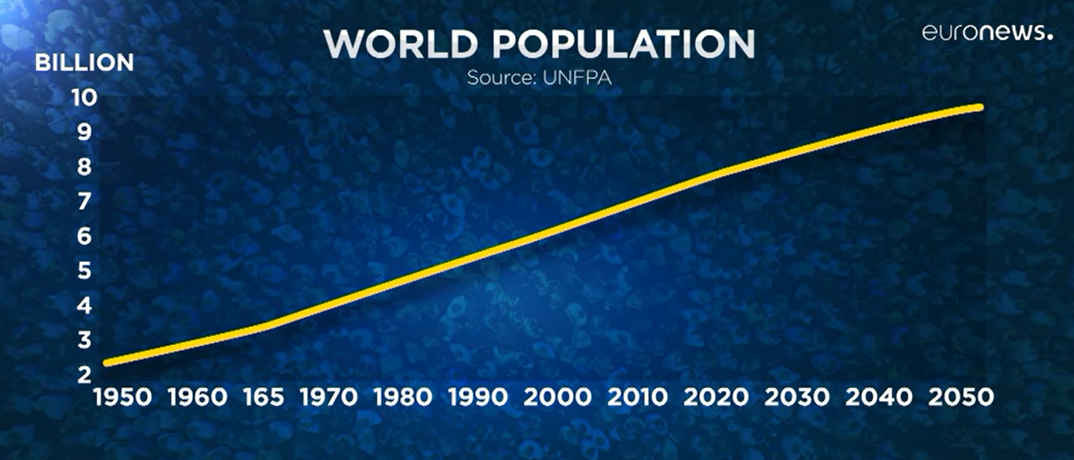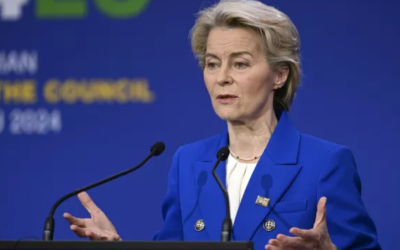The six contracts for the third Axis (Axis 3) of the “National Microsatellite Program,” between the European Space Agency (ESA) and…

The world’s population has exceeded 8 billion and by 2023 India, with a population of 1.4 billion people, will become the world’s most populous country, overtaking China.
According to official figures of the UN, in the coming decades, India will experience a rapid increase in its urban population, while its megacities are already overcrowded and face shortages in basic infrastructure.
In Mumbai, about 40% of the population lives in slums, overcrowded areas where people live in makeshift shacks and most often have no running water, electricity, or sanitation.
Global indicators hide a huge demographic diversity. More than half of the world’s population growth by 2050 will come from just 8 countries, according to the UN: the Democratic Republic of the Congo, Egypt, Ethiopia, India, Nigeria, Pakistan, the Philippines, and Tanzania.
At the end of the century, the three most populous cities in the world will be in Africa: Lagos in Nigeria, Kinshasa in DR Congo, and Dar es Salaam in Tanzania.
The population explosion causes greater problems in countries already facing poverty, as the ever-increasing birth rate, which causes rapid demographic growth, is both a symptom and a cause of slow progress in development, the UN reports.
For the UN this unprecedented growth – in 1950 there were 2.5 billion people on Earth – is the result of a progressive increase in life expectancy thanks to the advances made in the fields of public health, nutrition, personal hygiene, and medicine.
Yet demographic growth also raises great challenges for the poorest countries, where the greatest population growth is also observed.
While the Earth had less than a billion inhabitants by the 1800s, it took only 12 years for the population to grow from 7 to 8 billion.
The demographic slowdown is shown in the fact that it will take about 15 years for the population to reach 9 billion in 2037. The UN predicts that the population will reach 10.4 billion in the 2080s, before stabilizing by the end of the century.
The 8 billion mark was exceeded at the time of the UN Climate Conference (COP27) in Sharm el-Sheikh, Egypt, in which the disagreement between the richest countries (which are mainly responsible for global warming) and the poor (which are most affected and need help to cope) to significantly reduce greenhouse gas emissions was highlighted once again.
Our impact on the planet is mostly determined by our behavior than by our numbers, explained Jennifer Sciuba, a researcher at the Wilson Center.
Also read: EMSA | Sniffer drone of Greek ALTUS LSA to monitor ship emissions on Mediterranean Sea coast
READ MORE
Von der Leyen | Proposal for the creation of a European Civil Defence Mechanism
The European Commission’s President Ursula von der Leyen called for the launch of a European Civil Defence Mechanism, speaking about…
Flooding in Spain | 7,500 soldiers on the streets
King Felipe VI and Prime Minister Pedro Sanchez are expected to visit southeastern Spain today, 3/11/2024, where unprecedented…
PwC Cyprus, Multimarine, SignalGeneriX, and Theophrastus Join Forces for the EDA’s Symbiosis Project
A leading Consortium comprising PwC Cyprus, Multimarine Services Ltd, SignalGeneriX Ltd, and Theophrastus Research Institute, has been…
MBDA – Matra Electronique | Joint creation of a centre of excellence for defence electronics in Europe
MBDA and its subsidiary Matra Electronique (MEL), which specialises in manufacturing high-precision electronic equipment, jointly…
THEON International | New orders amounting to €74 million having already exceeded €150 million in the 4th trimester
THEON INTERNATIONAL PLC (THEON) announced additional orders for the month of November. As a result of the…
UN | Iran has increased uranium enrichment to near weapons-grade levels
Iran has further increased its stockpile of uranium enriched to near weapons-grade levels, defying international pressure, according to…
Brazil | Arrests of military and police officers for plotting the assassination of President Lula
Brazilian police have arrested five officers accused of plotting a coup which included plans to overthrow the government following the…
Sweden | Leaflets with survival instructions in the midst of the Ukrainian crisis
Sweden started sending out five million leaflets to the country’s residents yesterday, urging them to prepare for a possible conflict…























